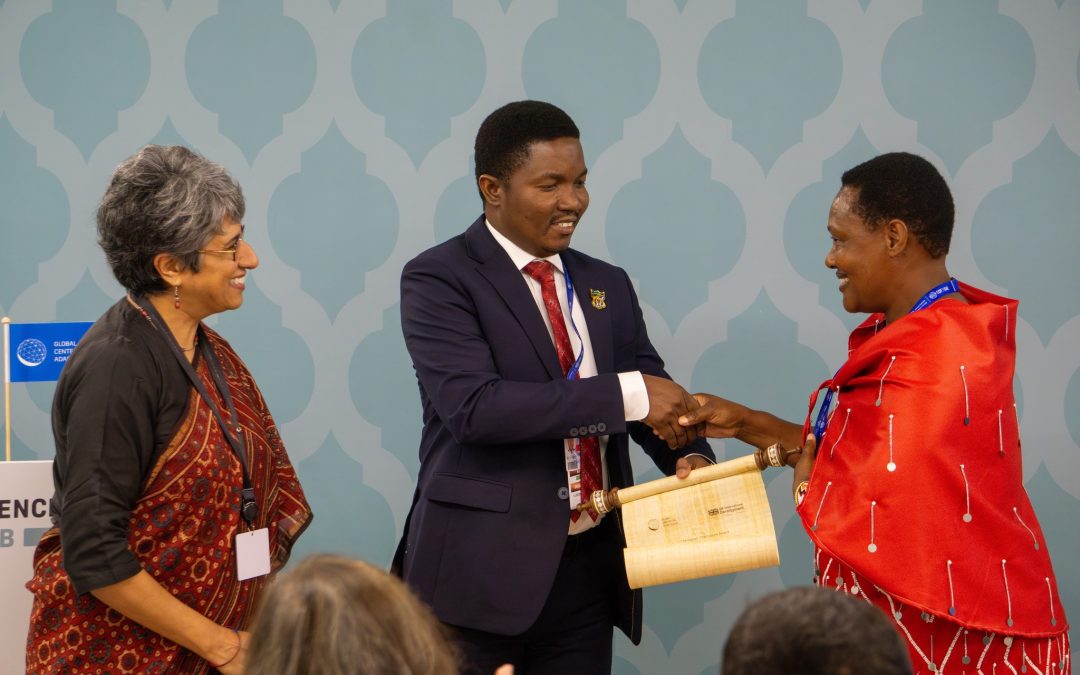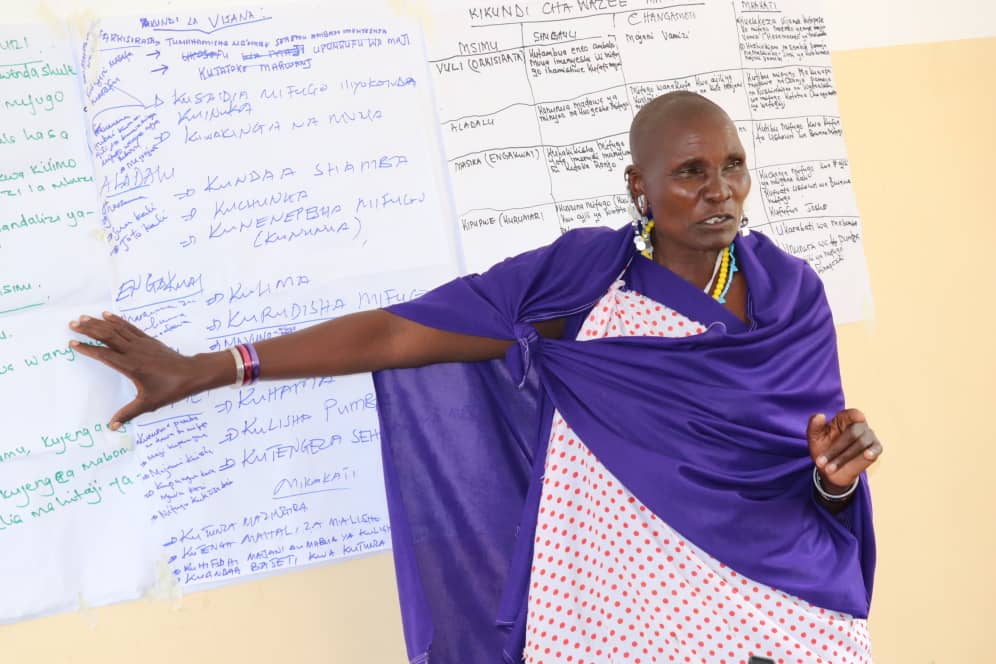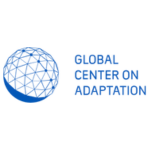In northern Tanzania, the Pastoral Women’s Council (PWC) enhances indigenous pastoralist women’s leadership capabilities to build women’s capacity to achieve equality as decision-makers in pastoralist societies. Indigenous pastoralist women undertake training and then form committees that plan, implement, and monitor climate change adaptation actions in their communities.
PWC currently operates in four Districts that are home to indigenous pastoralist communities, including the Maasai, Hadzabe, Sonjo, and Barabaig. These semi-arid and arid areas of Tanzania are particularly vulnerable to climate change-related hazards like droughts and flooding, which threaten livelihoods and create food insecurity, and their rangelands are also threatened by agricultural expansion, mining, and tourism.
Addressing inequities for pastoralist women
Maanda Ngoitiko, Co-founder and Executive Director, explains that empowering women is vital to ensure women’s priorities are addressed: “Although pastoralist men and women are equally exposed to climate shocks and stress, women have fewer opportunities to access and control productive resources or engage in alternative climate resilience livelihoods and incomes.” While men often venture further afield to seek employment in cities, women often remain at home to manage the household. Although this makes women’s knowledge of the environment crucial, “this knowledge, along with the specific plight women face, often goes ignored in drought-mitigation and adaptation strategies,” Ngoitiko notes.
PWC supports these pastoralist women by enhancing their leadership skills and participation in local decision-making forums, including a platform for developing and implementing action plans to support community action to mitigate the detrimental effects of climate change. These activities have included establishing grass seed banks to restore degraded land and provide income-generating activities for women and installing rainwater-harvesting technologies to ensure access to water during dry seasons using affordable, sustainable technologies.
Enhancing climate resilience
His Excellency Abul Kalam Abdul Momen, Minister of Foreign Affairs in Bangladesh and a member of the Jury selecting the Award winners praised PWC’s broad range of aims: “This initiative addresses the needs of a vulnerable community whose exposure to climate hazards and susceptibility to climate risks are relatively higher. The various forms of livelihood training provided by the initiative is helping foster long-term economic empowerment of local women and contributing to their climate resilience. In addition, the initiative is also ensuring women’s engagement and participation in decision-making forums which have traditionally been men-only spaces within indigenous pastoralist communities in Tanzania, and thereby further helps develop women’s leadership for locally led adaptation.”
Climate change interventions in Longido, Monduli, and Ngorongoro have resulted in local government authorities, non-governmental organizations, and local communities raising funds of more than 900,000 USD for key development projects. These funds have helped communities enact local by-laws to protect water sources and grazing land, provide emergency food during periods of drought, upgrade water systems, and construct new irrigation systems. The UK Minister of State (Development and Africa) at the Foreign, Commonwealth, and Development Office, Andrew Mitchell, another Jury Member, described the PWC project as “an impressive example of empowering women and local communities to plan, implement, and monitor improved climate resilience according to the needs of their communities.”
Grass seed banks have now also been established in Loitoktok, Kenya, after PWC participated in knowledge-exchange and learning visits. During the selection process, Jury Member and Global Center on Adaptation CEO Patrick Verkooijen praised PWC’s “exceptional focus on women’s decision-making,” while Minister for Development Cooperation and Global Climate Policy in Denmark and fellow Jury Member Dan Jørgensen asserted that “tapping into women’s knowledge of their environment is key to successful climate-adaptation at the local level. I am very pleased to see the success of an organization by and for the target community.”
Recognition for adaptation efforts for pastoralist women
Winning the Local Adaptation Champions Award will allow PWC to strengthen interventions that upskill indigenous pastoralist women and enhance their leadership capabilities to ensure more women are involved in community action planning and can contribute to supporting their communities to manage the adverse effects of climate change. PWC will utilize the prize money to provide leadership training for 50 “women champions” working in climate change adaptation, and five women’s groups and forums will be educated about grass seed banks and water-harvesting techniques.

The Women in Leadership category at this year’s Local Adaptation Champions Awards shone a spotlight on women leaders at the local, national, or global level who have designed or are implementing climate resilience efforts in and for local communities. Global Center on Adaptation invited applications from individual women and women’s groups championing the cause of local adaptation in a variety of ways, from those who are part of government and non-government organizations to women working in the private sector or for educational institutions.
The Local Adaptation Champions Award
The Local Adaptation Champions Awards reward inspiring and scalable locally-led adaptation efforts to address the impacts of climate change and build resilience in the most vulnerable communities. Global Center on Adaptation, climate change experts, and a high-level Jury selected one winner in each of the four categories for 2023: Capacity Building, Business Adaptation Solutions, Innovation in Devolving Finance, and Women in Leadership. Over 500 applications were received from individuals and organizations for this year’s Awards, and applications came in from all over the world.
The four winners were presented with their Awards at an awards ceremony at the COP28 climate summit, and each winning project will receive €15,000 and get an opportunity to attend the Adaptation Fund’s readiness events.
“As the climate crisis continues to escalate, these Awards shine a light on community-led local adaptation measures that can effectively build resilience at the grassroots,” Verkooijen said. “We are excited to follow the winners’ journeys over the next year and beyond as they utilize the Award prize money and Adaptation Fund sponsorship opportunities to develop and scale up their work.”



